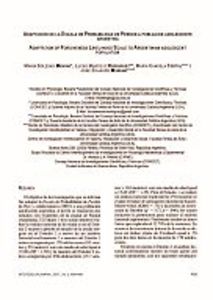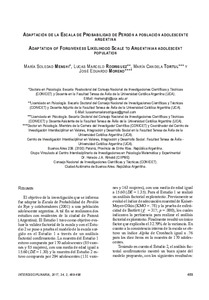Por favor, use este identificador para citar o enlazar este ítem:
https://repositorio.uca.edu.ar/handle/123456789/5793| Campo DC | Valor | Lengua/Idioma |
|---|---|---|
| dc.contributor.author | Menghi, María Soledad | es |
| dc.contributor.author | Rodríguez, Lucas Marcelo | es |
| dc.contributor.author | Tortul, María Candela | es |
| dc.contributor.author | Moreno, José Eduardo | es |
| dc.coverage.spatial | Argentina | es |
| dc.date.accessioned | 2019-06-06T00:58:28Z | - |
| dc.date.available | 2019-06-06T00:58:28Z | - |
| dc.date.issued | 2017 | - |
| dc.identifier.citation | Menghi, M.S., Rodríguez, L.M., Tortul, M.C., Moreno, J.E. (2017). Adaptación de la Escala de Probabilidad de Perdón a población adolescente argentina [en línea] Interdisciplinaria 34(2). Disponible en: https://repositorio.uca.edu.ar/handle/123456789/5793 | es |
| dc.identifier.issn | 1668-7027 | - |
| dc.identifier.uri | https://repositorio.uca.edu.ar/handle/123456789/5793 | - |
| dc.description.abstract | Resumen: El objetivo de la investigación que se informa fue adaptar la Escala de Probabilidad de Perdón de Rye y colaboradores (2001) a una población adolescente argentina. A tal fin se realizaron dos estudios con residentes de la ciudad de Paraná (Argentina). El Estudio 1 tuvo como objetivo evaluar la validez factorial de la escala y con el Estudio 2 se puso a prueba el modelo de la escala surgido en el Estudio 1 a través de un análisis factorial confirmatorio. La muestra del Estudio 1 es tuvo compuesta por 170 adolescentes (85 varones y 85 mujeres), con una media de edad igual a 15.60 (DE = 1.30) y la muestra del Estudio 2 estuvo compuesta por 294 adolescentes (131 varones y 163 mujeres), con una media de edad igual a 15.60 (DE = 1.35). Para el Estudio 1 se realizó un análisis factorial ex ploratorio. Previamente se evaluó el índice de adecuación muestral de Kaiser- Meyer-Olkin (KMO = .78) y la prueba de esfericidad de Bartlett (χ2 = 317; p = .000), los cuales indicaron la pertinencia para realizar el análisis factorial exploratorio. Finalmente resultó un único factor que explicaba el 32.79% de la variancia. En cuan to a la consistencia interna de la escala se obtuvo un índice Alpha de Cronbach igual a .76 para los diez ítems en la muestra de 170 adolescentes. Te niendo en cuenta el Estudio 2, el análisis factorial confirmatorio mostró un buen ajuste del modelo propuesto, con los siguientes resultados: χ2(32) = 86.27; p =.000, χ2/gl = 2.69, CFI = .93, GFI = .94, RMR = .059 y RMSEA = .076. La adaptación del instrumento mostró buenas propiedades psicométricas de la escala para su uso en población argentina | es |
| dc.description.abstract | Abstract: Forgiveness has positive implications for the emotional and social development. Several inves - tigations have concluded that there is a strong neg ative correlation between forgiveness and the expression of anger and depression. It has been empirically shown that forgiveness has positive effects on mental health and psychophysical well - being. Through this capability the negative feelings of revenge and resentment are transformed into more positive feelings such as compassion and generosity, allowing to convert a negative and pain - ful past into a positive one, thus strengthening the experiences through a reflective and peaceful look. In adolescence grievance situations are usual ly very frequent. Faced with these situations forgive - ness is of great importance to restore the bonds between peers or family; essential bonds for the emotional support at this stage. This clearly shows the importance in the profound study of forgive - ness as a variable that fosters psychological health in adolescence. This requires having instru ments with good psychometric properties that can mea - sure the ability to forgive in the Spanish - speaking population, more precisely the one from Argen ti - na. The objective of this paper is to adapt Rye’s Forgiven ess Likelihood Scale (2001) to the Argen - tinian adolescent population. Two studies were conducted for this purpose. The aim of Study 1 was to evaluate the factorial validity of the scale. Study 2 aimed at testing the scale model emerged in Study 1 through a confirmatory factor analysis. The Study 1 sample consisted of 170 adolescents (85 males and 85 females) with a mean age of 15.60 (SD = 1.30). The Study 2 sample consisted of 294 adolescents (131 males and 163 females) with a mean age of 15.60 (SD = 1.35). Both sam - ples were from Paraná City (Argentina). In both studies the samples were obtained in the same way. It was contacted secondary schools authori - ties to give them information about our research and to get their permission to carry it out. Then, parents’ authorization was asked (informed con - sent). The samples were taken in groups of 20 to 30 adolescents approximately. During the ad - ministration at least two researchers were present. It was obtained the KMO sampling adequacy In - dex (.78) and the Bartlett Test of Sphericity (χ2 = 317; p = .000), both of them indicate that it is appropriate to conduct the AFE. From the factor analysis the result is the existence of a single factor that explains 32.79% of the variance. To assess the internal consistency of the Forgiveness Likelihood Scale, the Cronbach Alphawas calculat ed, showing a coefficient of .76 for the ten items of the scale in the sample of 170 adolescents. As for Study 2, the results of confirmatory factor analysis are: χ2(32) = 86.27; p = .000, χ2/gl = 2.69, CFI = .93, GFI = .94, RMR = .059, and RMSEA = .076. These results indicate a good fit of the proposed model. Thus, both studies con - vey the good adaptation and psychometric properties of the Forgiveness Likelihood Scale to Argentinian adolescent population. One of the limitations of the present research is the lack of convergent and discriminant validity studies. Both studies were conducted with the original version of the scale, obtaining a positive correlation with the Enright Forgiveness Inventory and other for giv e - ness measures. Further research should include this type of studies | es |
| dc.format | application/pdf | es |
| dc.language.iso | spa | es |
| dc.publisher | Centro Interamericano de Investigaciones Psicológicas y Ciencias Afines | es |
| dc.rights | Acceso Abierto | es |
| dc.rights.uri | https://creativecommons.org/licenses/by-nc-sa/4.0/ | es |
| dc.source | Interdisciplinaria 34(2), 2017 | es |
| dc.subject | PERDON | es |
| dc.subject | ADOLESCENTES | es |
| dc.subject | PSICOMETRIA | es |
| dc.subject | ESCALA | es |
| dc.title | Adaptación de la Escala de Probabilidad de Perdón a población adolescente argentina | es |
| dc.title | Adaptation of forgiveness likelihood scale to Argentinian adolescent population | es |
| dc.type | Artículo | es |
| uca.path | Facultad Teresa de Ávila (Paraná)|Departamento de Humanidades|Artículos | es |
| uca.disciplina | PSICOLOGIA | es |
| uca.filename | /home/data-uca-generic/folder_generic_common/Envio Parana/Departamento de Humanidades/Articulos/adaptacion-escala-probabilidad-perdon/metadata.xml | es |
| uca.issnrd | 1 | es |
| uca.affiliation | Fil: Menghi, María Soledad. Consejo Nacional de Investigaciones Científicas y Técnicas; Argentina | es |
| uca.affiliation | Fil: Menghi, María Soledad. Universidad Católica Argentina. Facultad "Teresa de Ávila". centro de Investigación Interdisciplinar en Valores, Integración y desarrollo Social | es |
| uca.affiliation | Fil: Rodríguez, Lucas Marcelo. Consejo Nacional de Investigaciones Científicas y Técnicas; Argentina | es |
| uca.affiliation | Fil: Rodríguez, Lucas Marcelo. Universidad Católica Argentina. Facultad "Teresa de Ávila". centro de Investigación Interdisciplinar en Valores, Integración y desarrollo Social | es |
| uca.affiliation | Fil: Tortul, María Candela. Consejo Nacional de Investigaciones Científicas y Técnicas; Argentina | es |
| uca.affiliation | Fil: Tortul, María Candela. Universidad Católica Argentina. Facultad "Teresa de Ávila". centro de Investigación Interdisciplinar en Valores, Integración y desarrollo Social | es |
| uca.affiliation | Fil: Moreno, José Eduardo. Consejo Nacional de Investigaciones Científicas y Técnicas; Argentina | es |
| uca.affiliation | Fil: Moreno, José Eduardo. Universidad Católica Argentina. Facultad "Teresa de Ávila". centro de Investigación Interdisciplinar en Valores, Integración y desarrollo Social | es |
| uca.version | publishedVersion | es |
| item.fulltext | With Fulltext | - |
| item.languageiso639-1 | es | - |
| item.grantfulltext | open | - |
| crisitem.author.dept | Facultad "Teresa de Ávila" (Paraná) | - |
| crisitem.author.dept | Departamento de Humanidades (Sede Paraná) | - |
| crisitem.author.dept | Centro de Investigación Interdisciplinar en Valores, Integración y Desarrollo Social | - |
| crisitem.author.dept | Facultad "Teresa de Ávila" (Paraná) | - |
| crisitem.author.dept | Departamento de Humanidades (Sede Paraná) | - |
| crisitem.author.dept | Centro de Investigación Interdisciplinar en Valores, Integración y Desarrollo Social | - |
| crisitem.author.dept | Consejo Nacional de Investigaciones Científicas y Técnicas | - |
| crisitem.author.dept | Facultad "Teresa de Ávila" (Paraná) | - |
| crisitem.author.dept | Departamento de Humanidades (Sede Paraná) | - |
| crisitem.author.dept | Centro de Investigación Interdisciplinar en Valores, Integración y Desarrollo Social | - |
| crisitem.author.dept | Consejo Nacional de Investigaciones Científicas y Técnicas | - |
| crisitem.author.dept | Facultad "Teresa de Ávila" (Paraná) | - |
| crisitem.author.dept | Centro de Investigación Interdisciplinar en Valores, Integración y Desarrollo Social | - |
| crisitem.author.orcid | 0000-0002-6941-3482 | - |
| crisitem.author.orcid | 0000-0001-5525-1155 | - |
| crisitem.author.orcid | 0000-0002-9613-0664 | - |
| crisitem.author.parentorg | Pontificia Universidad Católica Argentina | - |
| crisitem.author.parentorg | Facultad "Teresa de Ávila" (Paraná) | - |
| crisitem.author.parentorg | Facultad "Teresa de Ávila" (Paraná) | - |
| crisitem.author.parentorg | Pontificia Universidad Católica Argentina | - |
| crisitem.author.parentorg | Facultad "Teresa de Ávila" (Paraná) | - |
| crisitem.author.parentorg | Facultad "Teresa de Ávila" (Paraná) | - |
| crisitem.author.parentorg | Pontificia Universidad Católica Argentina | - |
| crisitem.author.parentorg | Facultad "Teresa de Ávila" (Paraná) | - |
| crisitem.author.parentorg | Facultad "Teresa de Ávila" (Paraná) | - |
| crisitem.author.parentorg | Pontificia Universidad Católica Argentina | - |
| crisitem.author.parentorg | Facultad "Teresa de Ávila" (Paraná) | - |
| Aparece en las colecciones: | Artículos | |
Ficheros en este ítem:
| Fichero | Descripción | Tamaño | Formato | |
|---|---|---|---|---|
| adaptacion-escala-probabilidad-perdon.jpg | 7,37 kB | JPEG |  Visualizar/Abrir | |
| adaptacion-escala-probabilidad-perdon.pdf | 263,47 kB | Adobe PDF |  Visualizar/Abrir |
Visualizaciones de página(s)
175
comprobado en 30-abr-2024
Descarga(s)
167
comprobado en 30-abr-2024
Google ScholarTM
Ver en Google Scholar
Este ítem está sujeto a una Licencia Creative Commons

